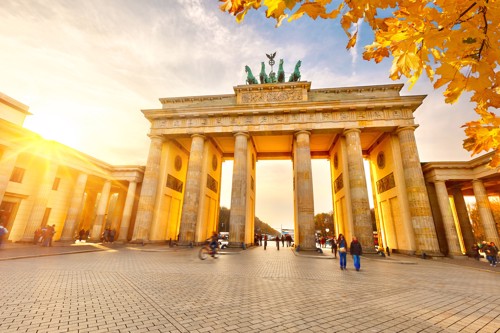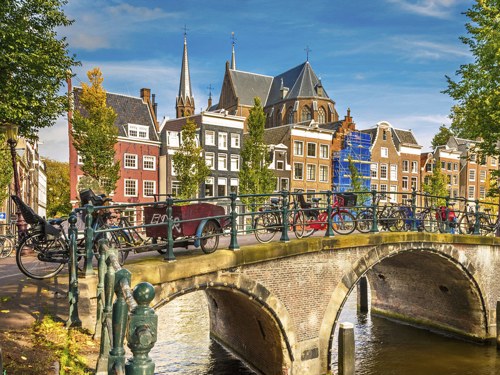Embarking on a school trip is an exciting venture for both students and educators alike, offering a unique opportunity for learning beyond the confines of the classroom. However, as the world of travel evolves, unfortunately, so do the associated costs.
Between flights, accommodation and included excursions and meals, you’d think your budget would be covered. And, in many cases, you’d be correct. However, with some cities hoping to offset the negative impacts of tourism, you may be subject to unexpected tourist taxes set by your destination upon arrival.
In recent times, the rise of destination-specific tourist tax has added a new layer of financial consideration for teachers and group leaders planning school trips. In this blog, we’ll run through the cities that have introduced this tax to visitors, so you can prepare for your next school trip fully informed.
What is tourist tax?
Tourist tax (sometimes called city tax, culture tax, or occupancy tax) is a fee imposed by destinations on visitors, often collected upon arrival or departure of your accommodation. These charges typically contribute to local infrastructure, environmental initiatives, or the preservation of cultural heritage.
While the intentions behind these taxes are easy to rationalise, it’s key that teachers and group leaders be aware of these additional costs when planning their school trips.
Which destinations have a tourist tax?
Tourist tax has long been the norm in several countries in Europe, and in the US. But it’s not imposed in every country.
Below, we explore some of our most popular destinations, and their associated tourist taxes.
Please note: Tourist taxes are subject to change, and while we will always endeavour to keep this information up-to-date, we recommend to always double-check the latest information for your school trip. If your intended destination is not listed below, please get in touch or check your destination country’s tourism office to find out up-to-date tourist taxes.
How much is tourist tax in France?

The country’s tourist tax – or taxe de séjour – is charged per person, per night and varies according to the standard and quality of the accommodation, as well as the municipality you choose to stay in.
Generally, in France, children under the age of 18 are exempt from paying tourist tax.
Tourist tax in Paris & Île-de-France (includes Disneyland)
|
3-star hotel |
€5.20 per person per night |
|
2-star hotel |
€3.25 per person per night |
|
1-star hotel |
€2.60 per person per night |
Tourist tax in Normandy
|
3-star hotel |
€1.60 per person per night |
|
2-star hotel |
€1.00 per person per night |
|
1-star hotel |
€0.80 per person per night |
Tourist tax in Berck-sur-mer (Opal Coast)
|
3-star hotel |
€1.40 per person per night |
|
2-star hotel |
€1.00 per person per night |
|
1-star hotel |
€0.80 per person per night |
Tourist tax in Lille
|
3-star hotel |
€1.76 per person per night |
|
2-star hotel |
€1.10 per person per night |
|
1-star hotel |
€0.88 per person per night |
How much is tourist tax in Spain?

Some Spanish regions have introduced tourist taxes, such as Catalonia and, soon, Valencia.
Tourist tax in Barcelona
Barcelona imposes a per-person, per-night tourist tax for overnight stays, for all those over 17 years of age.
|
3-star or below accommodation (EB3) |
€3.75 per person per night |
Tourist tax in Valencia
Valencia has announced that it will soon introduce a tourist tax for travellers staying in any type of accommodation in the region.
Officially named the Valencian Tax on Tourist Stays (IVET), the tax is due to come into effect in 2024, and will charge visitors between 50 cents and €2 per night per person, depending on their chosen accommodation.
Tourist tax in Madrid
As of January 2024, there are no tourism taxes applied to stays in Madrid.
How much is tourist tax in Italy?

Italy has implemented a tourist tax in various cities, including Rome, Florence, and Venice. These average around €5 per night, but can be even more for higher quality accommodations.
Tourist tax in Rome
The Eternal City increased their tourist tax in 2023. Now, the amount of euros each guest must pay is calculated per person per night, and varies depending on the star-rating of their hotel.
The tariff (as of 2024) applies to all guests over the age of 10, and is as follows:
|
3-star hotel |
€6 per person per night |
|
2-star hotel |
€5 per person per night |
|
1-star hotel |
€4 per person per night |
Tourist tax in Florence
Similar to Rome, the tourist tax in the birthplace of the Renaissance varies with the accommodation. The tariff applies to all guests over the age of 12.
|
3-star hotel |
€6 per person per night |
|
2-star hotel |
€4.50 per person per night |
|
1-star hotel |
€3.50 per person per night |
Tourist tax in Venice
Venice has newly proposed a tourist tax in 2024, with a trial launching between April and mid-July. During this trial, on predominantly weekends and peak days between 8.30am and 4pm, visitors will have to pay €5 to access the city. This will affect day excursions more than school trips based in Venice, however, as the fee is waived for those staying overnight.
How much is tourist tax in Germany?

Germany has what they call a 'culture tax' (kulturförderabgabe), and also a ‘bed tax’ (bettensteuer), in cities including Berlin, Hamburg, and Frankfurt.
Schools, however, may be exempted from paying tourist tax in Germany; your tour operator should provide you with the necessary paperwork upon booking.
Tourist tax in Berlin
The city tax in Berlin equals 5% of the net price of accommodation.
Tourist tax in Munich
As of January 2024, Munich does not charge any type of tourist taxes.
How much is tourist tax in Austria?

Austria’s tourism levy, known locally as tourismusgesetz or berherbergungsbeiträge, varies depending on which province you’re in.
Tourist tax in Vienna & Salzburg
In Vienna and Salzburg, you can expect to pay an additional 3.2% on top of your accommodation bill to cover tourist tax. Visitors aged 15 or under at the end of the calendar year are exempt.
How much is tourist tax in The Netherlands?

In several cities across the Netherlands, visitors are charged a tourist tax called toeristenbelasting. The rules for this tax vary according to the city you’re staying in.
Tourist tax in Amsterdam
Amsterdam’s tourism levy is currently set at around an added 7% of the cost of accommodation. However, in 2024, it has been announced this will rise to 12.5%, making it the highest tourist tax in Europe.
When booking with Equity, we include Amsterdam’s tourist tax in the cost of your school trip, so you won’t be required to pay again upon arrival.
How much is tourist tax in the USA?

A hotel tax or lodging tax is charged at accommodations across most of the United States. It’s also called an occupancy tax. This fee differs per state, and may not necessarily be adopted state-wide, so it’s always worth checking with the fees with your accommodation prior to booking.
Tourist tax in New York City
In New York City, hotel rooms are subject to a 14.75% occupancy tax, plus a nightly fee of $3.50.
Tourist tax in Los Angeles
Any visitors in Los Angeles can expect additional charges of around 15.5% to cover occupancy and tourist tax.
Please note: when travelling to the USA from the UK, visitors additionally need to apply for an ESTA (Electronic System for Travel Authorisation), a type of visa that allowing travellers to stay in the country for up to 90 stays. It is valid for two years, and costs $21 (about £17) per person.
Is my tourist tax included in my school trip package?
When you book with Equity, we aim to make the process of planning and budgeting for your school trip as smooth as possible. In some cases, it’s simpler to include tourist tax in the cost of your school trip; such is the case with our school trips to Geneva and Amsterdam, where tourist tax is applicable to all members of your group.
In several destinations, such as Greece and Italy, tourist tax must be paid locally, so we are unable to include tourist tax as part of your booking, and advise this is budgeted into your trip costs as early as possible.
Meanwhile, in certain school trip locations (notably Germany), there is an exemption for tourist tax among school groups who complete out the necessary forms.
Tourism tax preparedness makes for a stress-free school trip
While the introduction of destination-specific tourist taxes adds a layer of complexity to school trip planning, being well-informed and proactive can help teachers and group leaders navigate these challenges successfully.
We’ve done our best to include some guidance around the kind of costs you can expect above, but we recommend double-checking with your accommodation, tour operator, or the tourism board for your destination before travelling, to be sure how much you need to pay.
By factoring these costs into your budget, you can look forward to a school trip without any financial surprised, leaving you and your students to enjoy your trip stress-free!
To enquire about a school trip, please contact us on 01273 648248. You can also fill out our webform, and our school trip experts will get back to you as soon as we can.






